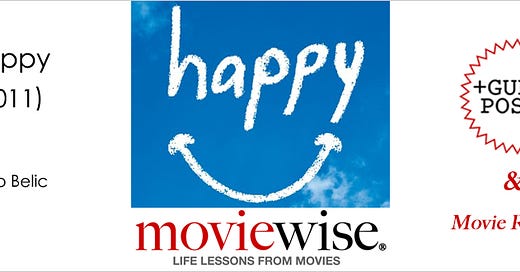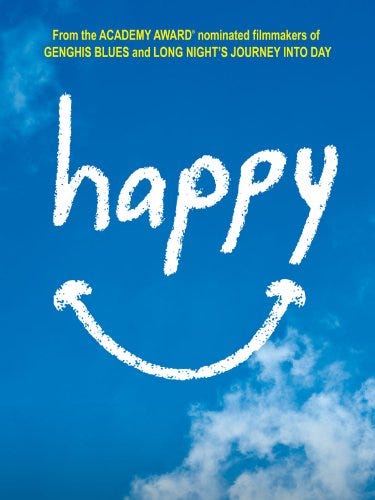"Happy" (2011) — The Secrets Of Happiness
+Guest Posts: Movie Wisdom By Guest Writer Mary Tabor—Issue #10
Image by moviewise from RedBubble
The Movie:
Happy (2011) is a documentary by director Roko Belic about research studies on happiness, which features Mihaly Csikszentmihalyi, who explains his theory of Flow, what athletes call “being in the zone,” a state of fulfillment during demanding physical activity.
Life Lesson: People find happiness when they are: engaging in play, having new experiences, feeling connected to a community through friends and family, doing things that are meaningful (helpful), and appreciating what they have.
🍿Movie Scene Link (movie quote)
Guest Writer:
Mary L. Tabor writes about fiction, memoir, the arts, and teaches in ‘Only Connect …’
Have you ever leaped before you looked?
The film Happy examines intrinsic well-being through real-life examples from all over the world and through commentary by researchers and psychologists.
Professor Daniel Gilbert explains how humans recover and are resilient “when bad things happen.” Melissa Moody, a once great beauty featured in “Town And Country” magazine as one of the top 50 debutantes at the International Debutante Ball in 1969, brutally disfigured in an accident, tells her story, proving Gilbert’s assertion.
I’m learning that wisdom as I recover from my son’s death. When he died at age 47, I heard the death knell of my own existence. In mourning, I began to journal while paralyzed on the novel I’d been finishing.
Here’s one entry:
My grief was like the ocean and here is what she said: I stand on a wave above you. You see me. You hear me. You want me. When I call to you, you answer. You don’t think I know you, see you, hear you, want you, but I do. I am dressed in a chiffon dress that mirrors the sea your son loved. It is not sky blue, it is green-blue, some days as green as his eyes that were so sad, that saw what was coming, that couldn’t overcome but tried. I am like you. I hear you say, “No you’re not. You are strong and I am weak.” But you are wrong. Though I pull you with the flow of my long black hair in an ocean of wind and though you think I pull you into the sea, that you will drown, again you are wrong. You will float on the chiffon of my dress as the waves crest and fall and you will rise like the sun you have seen behind my form.
That’s not a piece I’ve thought to publish, but it is the voice of my work.
Would I have been able to accept my life’s work as a writer if I’d not met Mihaly Csikszentmihalyi? He’s featured in the film as the author of Flow: The Psychology of Optimal Experience that delves into the feeling of ‘being in the zone.’ I met him when he was finishing that book while head of the Psychology Department at the University of Chicago, where my then-corporate job sent me for management training before, what I didn’t know, was a planned promotion.
Csikszentmihalyi was my personal mentor. I met with him one-on-one often. In class, one day, he explained the sense of “flow” and asked if anyone knew what he meant or had experienced it. I shyly raised my hand partially from the back of the room. Near the end of the intensive training and testing, I was called to a meeting of all the professors who told me, in strict confidence, that, though I would surely succeed in my job, I was an “artist” and should find my way out to the work I was meant to do—and that I knew would not likely provide what the psychologists in the film refer to as extrinsic values: money, as one example.
That process took me a while, but eventually as W.H. Auden tells us:
The sense of danger must not disappear:
The way is certainly both short and steep.
However gradual it looks from here;
Look if you like, but you will have to leap.
The film Happy—with its visits to Denmark’s co-housing community, to Okinawa where a disproportionate number of the world’s oldest people live, and to other people all across the world—asks us to look inside and find our way, even if that path requires us to leap before we look.
moviewise Review:
Perhaps ironically, one of the paths toward personal happiness is reached by turning the focus away from ourselves. It’s a funny thing, but we seem wired to adapt to our circumstances, what the documentary Happy (2011) calls our “set point,” which means that most of the time we settle into a base level of happiness and experience about the same level of happiness as we’ve always felt.
Your nervous system is a differential engine. It looks at differences. It looks at contrasts. That’s all it cares about.
— Pendleton Read Montague, Jr. Professor of Neuroscience
In other words, we take our happiness for granted. We don’t appreciate all the good things and people and loved ones in our lives that make us happy because we just get used to having them. To feel happy, we want more. Specifically, we want something novel and different. This is also called the hedonic treadmill, or hedonic adaptation.
But if you move away from that internal pull and instead put your focus and energy on something else or on others, a wonderful thing happens: Suddenly, you are no longer the tragic figure of an epic play who is always searching for an elusive constant level of happiness and joy. Instead, if you focus on a goal, you become a master perfecting a craft, experiencing flow on a regular basis as you immerse yourself in an activity that allows you to feel intrinsic reward from personal growth. Or, if you focus on others, you become a hero who is concerned for and attentively helps those in need. Both of these paths allow you to become a member of a community, and both allow you to find meaning and purpose in life.
We studied some of the happiest people and we found, without exception, that all of them had close supportive family and friends.
—Ed Diener, Professor of Psychology
When you take the time to care about something or to be kind to others, it gives you relief from worrying, lamenting, and bellyaching over every little thing in your life. Getting to know other people who share your passions amplifies the joys. Getting to know other people and their sorrows, pains, and annoyances gives you perspective and helps you to stop taking all the good things in your life for granted.
In other words, if you focus on yourself you’ll seem like a tragic figure, but if you focus on something else or on others, you’ll feel like a hero. That’s one of the secrets to happiness.
There are others, and many are found in the movie Happy (2011). Please allow yourself the joy of discovering them for yourself by watching this eye-opening documentary.
With happiness, the more you have, the more everyone has.
—Narrator, Happy (2011)
Want to publish your very own guest post on moviewise: Life Lessons From Movies and share with the world your most impactful, most wonderful, and most profound movies? Reply to this or leave a comment below to get started 🤗.
Visit the moviewise catalogue—a searchable database of one sentence movie summaries, movie quotes, and movie wisdom—for movie recommendations.
Also visit the moviewise store. Get a t-shirt, bag, or pillow with your favorite #LifeLesson from a movie. Reply to this or leave a comment below to make a request.











I hadn't come across that Auden verse before. I wish I had known of it when I was teaching school students. I was continually telling them to find and then pursue what they loved (but get qualified first!). It would have been good to have been supported by a quotation from a poet
Thanks, Mary, for sharing your intimate personal connection to this film. I'm going to give it a look right now!